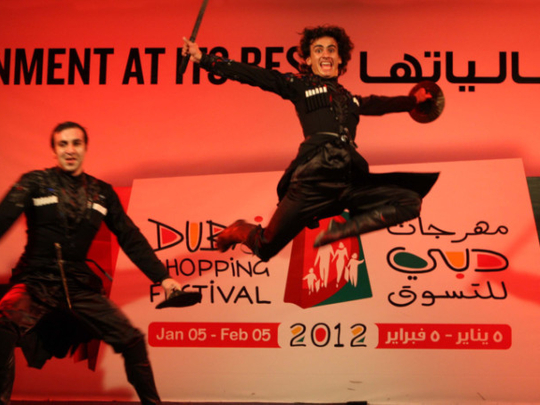
Few regional brands generate the amount of global appeal like the Dubai Shopping Festival (DSF). “More than just an event name, the DSF brand represents many intangible aspects: a collection of feelings and perceptions about quality, image, lifestyle and status,” says Matthew Ranson, Partner and Chief Strategy Officer of Dubai-based branding consultancy firm Ranson.
Launched in 1996 under the directives of His Highness Shaikh Mohammad Bin Rashid Al Maktoum, Vice-President and Prime Minister of the UAE and Ruler of Dubai, DSF’s ambition was to position Dubai as a leading tourist destination, something it has achieved and how. Across ages, cultures and religions, the joy of shopping and so much more makes the DSF brand tick, generating billions in revenue and valuable points in brand recall.
Shopping and lots more
“DSF stands for the joy of shopping but by that we not only mean buying, we mean a host of things from eating out, entertainment and sightseeing, to shows and competitions,” says Olivier Auroy, Managing Director of global design consultancy firm Fitch Middle East. “That’s the secret of DSF: making sure buying is a starting point, just the beginning of something bigger. Over time, DSF has become an icon — there is Christmas, Ramadan, Halloween, summer vacation and DSF. With DSF, Dubai added a season to the calendar.”
Ranson is of the opinion that the DSF brand has grown organically through the behaviour and communication of Dubai. “However, as Dubai faces stiff competition from its neighbours, who are also promoting shopping festivals with the aim of attracting tourists, the brand would do well to start thinking long and hard about its future point of difference,” he says.
“The brands we create all have one thing in common — they have all discovered their essential truth or their guiding principle and having done so, allow their guiding principle to govern the three most important areas of the business: their culture, their reputation and their products and services,” says Ranson.
Being unique
The fact that the DSF is different from the rest of the shopping festivals is vouched for by Charlotte DeWitt, President of US-based event management firm International Events. Having produced waterfront festivals and international events for the past three decades, DeWitt has experience in managing festivals and events across the US, Europe, Asia, Australia and the Middle East. “What is unusual about the Dubai model is that the government, in founding DSF in 1996, overcame the biggest hurdle of all — the role of the government itself in the life cycle of a festival or event,” she says.
“Unlike many city governments who adopt a gatekeeper role, Dubai’s visionaries chose an entrepreneurial role for the city,” says DeWitt. “They understood the benefits of creating a truly cooperative relationship between the government, retail stakeholders, tourism and hospitality operators, and cultural partners, while pioneering the development of a totally different type of world-class festival.”
Stunning figures
The proof that this move worked is in the numbers. Generating Dh2.15 billion in spend through 1.6 million visitors in its debut year, DSF saw 4.2 million visitors in 2011 who ended up spending a whopping $4.7 billion (about Dh17.26 billion) at the festival.
Another aspect that differentiates DSF from the competition, including the Hong Kong and Malaysia Shopping Festivals or the Great Singapore Sale, is its high-end luxury lottery — the opportunity to win unheard-of prizes ranging from private jets to Rolls-Royce cars, apartments and a mind-boggling amount of gold, says DeWitt. Even the travel experience is on sale, with discounted airline tickets, hotel rates and easy ground transportation, among other packages. The DSF meets the consumer’s expectations of the best, essential to attracting visitors from previous editions.
Festivals are perfect vehicle to help achieve multiple goals simultaneously. But the challenge over the years, from a global perspective, is for a festival to ensure that all its partners are collaborating as a team to reach these multiple goals, something DSF has achieved with aplomb.
Retail, travel and hospitality spending contributed Dh15.1 billion to Dubai’s economy during DSF 2011. This included the Dh5.9 billion spent by regional and international visitors and Dh6.6 billion spent by residents from other emirates.
And what has the festival done for the city itself? “DSF has played a significant role in promoting destination Dubai these past 17 years,” says Laila Mohammad Suhail, CEO of Dubai Events and Promotions Establishment, which organises DSF. Apart from being upheld has a shopping extravaganza, DSF is considered one of the best seasons to visit Dubai. Residents fly in their friends and family to join in the festivities during this period, she adds.
Plan of action
As banners welcome visitors to the 18th edition of the festival, Ranson believes that DSF would do well to uncover some simple brand components including its vision for the future, the promise it makes to the outside world, the values by which it operates and its guiding principle that sits at the heart of the business.
“It could also create a rich tone of voice that could be used across all market segments; making it much easier for advertising and public relations to extoll the virtues of the brand,” says Ranson. “Finally, the brand could look to re-engineer the creative [logo and expression] to better match the new strategic platform.”
Ultimately, Auroy believes that the festival needs to use its branding to talk more about Dubai and less about shopping. “After almost 20 years of existence, DSF must focus on the D (Dubai and destination) and the F (festival and fun),” he says.











